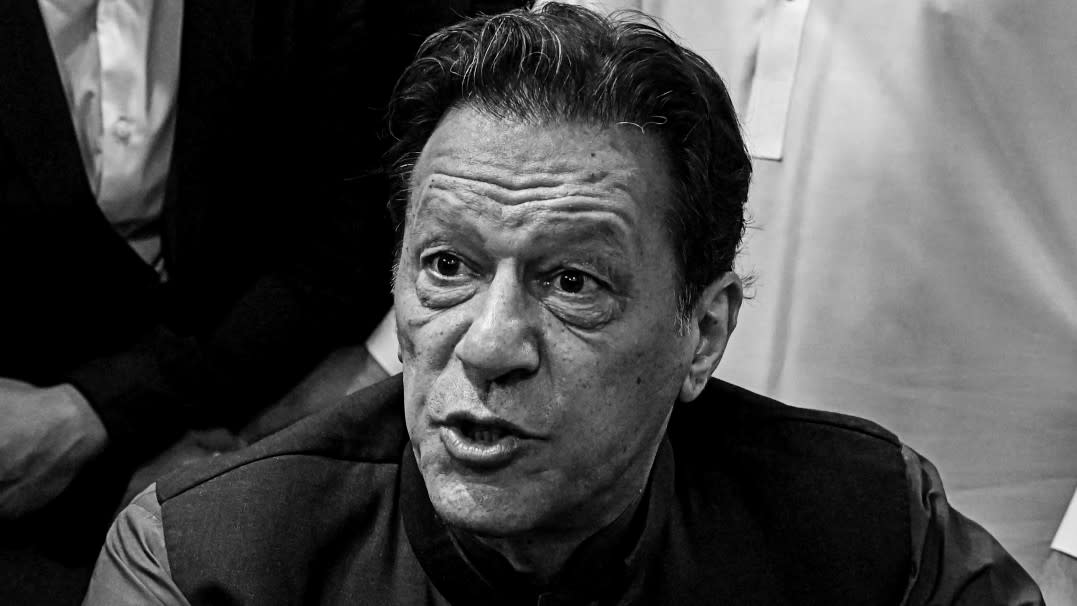Imran Khan sentenced to 10 years: how powerful is Pakistan's military?

- Oops!Something went wrong.Please try again later.
- Oops!Something went wrong.Please try again later.
- Oops!Something went wrong.Please try again later.
Pakistan's army was ranked the seventh most powerful in the world last year, but its political power is now under the spotlight amid claims the military has turned the country's upcoming elections "into a farce".
Former prime minister Imran Khan, once a star cricketer and later known as the "blue-eyed boy" of the country's military, was sentenced yesterday to 14 years in prison on charges of illegally profiting from state gifts. His sentencing comes days before the (delayed) 8 February general election, in which Khan had been barred from standing as the candidate for his party, Pakistan Tehreek-e-Insaf (PTI).
Khan was already serving a three-year jail term, after being ousted in April 2022 following a no-confidence vote, and hit with more than 180 charges ranging from rioting to terrorism. His supporters claim the charges were politically motivated – and coordinated by the army.
His arrest last year triggered "unprecedented" anti-military riots, said The Diplomat, but the government and army have since cracked down on his supporters and PTI workers, with dozens of party leaders going into hiding.
A long-standing foe of Khan, three-time former prime minister Nawaz Sharif, is now "tipped to win" next week's election, after recently returning from a four-year self-imposed exile in the UK, reported BBC News from Islamabad. Sharif was long "a thorn in the side of the powerful military", and was jailed days before Khan claimed victory in the 2018 election. But many now believe Sharif is "preferred" by the Pakistan military, while Khan "has fallen out of favour".
Sharif's daughter, Maryam Nawaz, the organiser for his party Pakistan Muslim League-Nawaz (PML-N), said last week that Pakistan's military establishment was responsible for ousting her father – and also for bringing him back.
What did the commentators say?
Although Pakistan has an interim government based in Islamabad, said Arun Anand on Indian news site Firstpost, "in reality it is playing with a lifeless remote as the affairs are effectively managed from Rawalpindi, which houses the General Headquarters (GHQ) of its powerful army".
The governing parties will "pull out all the stops" to prevent the PTI from winning the election, said historian Francis Pike in The Spectator – helped by the Pakistani army, "which laughably claims political impartiality". It is, however, "common knowledge that the army is the ultimate source of power in Pakistan".
Since the country gained independence in 1947, out of the Partition of India, it has had three periods of martial law: a total of 33 years. Even when not under martial law, politicians "rule under licence" from the army, said Pike.
Its "supremacy" over Pakistan's institutions was also born out of the war against India in 1948, former federal minister Asad Umar told Al Jazeera, and has since been shored up by multiple wars with its neighbour, and the perceived threat of more. The military has "consistently received more budgetary resources than any other government department", said Abid Hussain, Al Jazeera's correspondent in Islamabad.
Despite Pakistan being "on the verge of an economic meltdown", with an extravagant national debt, the army's assets grew by 78% between 2011 and 2015, Ayesha Jehangir, a postdoctoral research fellow at the University of Technology Sydney, wrote in an article on The Conversation. Today, the army's commercial assets are worth more than £20.6 billion.
And an estimated 12% of Pakistan's total land is owned by the army, according to Ayesha Siddiqa, a former researcher with the country’s naval forces.
"It should be noted", said Pike in The Spectator, "that Khan's political downfall coincided with his falling out with army head General Qamar Javed Bajwa, who retired recently with an estimated fortune of $33 million (£26 million)."
In his farewell speech, Bajwa conceded "in a rare admission" that Pakistan's military "had meddled in politics for decades", said Hussain. He promised that, in future, the army would "steer clear of interfering in Pakistan's democratic functioning". Now, "that assurance appears to have evaporated".
What next?
The military's influence goes far beyond politics, said Jehangir in The Conversation. It also controls information dissemination via censorship, and uses "vaguely worded draconian laws" to prosecute its enemies. "As a nuclear state, Pakistan's military is much like Voltaire's description of Frederick II of Prussia: it is a state within itself, benefiting from its sheer size, a great deal of money, and an advantageous geopolitical positioning."
Khan's team have promised to challenge "this ridiculous decision" of his conviction, but his experiences – and that of his rival Sharif – "underline why politicians in Pakistan often feel compelled to comply with the military's wishes", said Hussain for Al Jazeera.
But "one question above all lingers", he added – "can the country of 241 million people rectify the civilian-military imbalance, which has, to many critics, turned the latest vote into a farce?"

